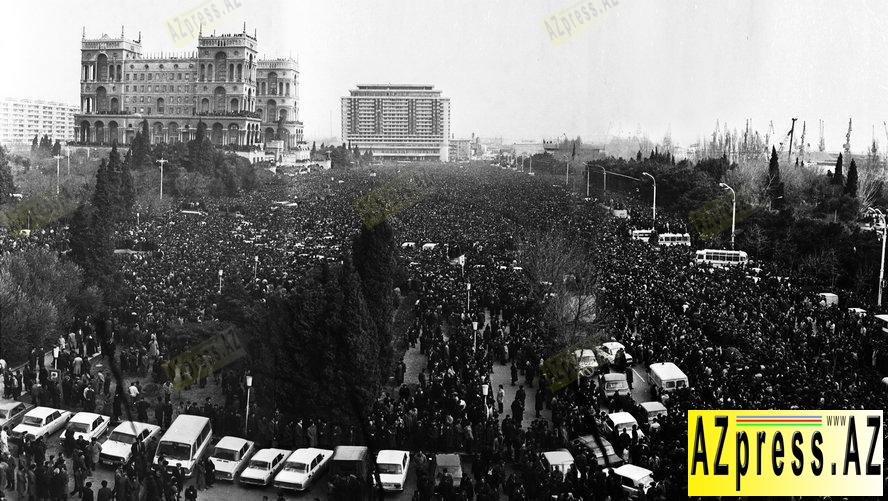By Azer HASRET, [email protected]
Those days I was a student. Azerbaijan still was a part of the Soviet Union. Thus, was not independent like today. There were no freedoms under hegemony of Russians in my beloved country. We were under exploitation.
More than 250 thousands Azerbaijanis living in Armenia were forced to deportation in 1988. And they faced beating, harassment, insults and even killing by Armenians in order to be eliminated. That`s why people of Azerbaijan were on raise.
And me, just coming back from the army service and as a student had joined newly formed Azerbaijan Popular Front in order to lead national struggle for the independence of Azerbaijan. Those days I was as an individual of my nation among those hundreds of thousands filling the squares.
But the Soviets were not keeping silence as well. They used Armenian citizens to open a way to any kind of provocation in Azerbaijan. Just to show that Azerbaijanis are killing Armenians and likewise. But in reality no one was killing Armenians. Those individual killings, which arose sometimes were masterminded by the agents of Moscow`s KGB and their servicemen Armenians. So the people were provoked to cause clashes between two nations.
In such a situation everyone was understanding that the Soviet soldiers are looking for excuse to occupy Baku. That was a case of moment for soldiers to step out their positions and to butter the people.
We were on watch around with my student comrades those days. Just starting from 17 January 1990 in the centre of Baku, around “Salyan barracks” – the military base – we patrolled through the nights, early morning returned to student hostel, and for the night came back to patrol surrounding.
The nights linking 17 January to 18 and 18 January to 19 passed in a quite environment. We were able to see bearded soldiers inside the military base. There were claims that they are Armenians. Anyway we urged everyone not to provoke soldiers.
We started patrolling on the night of 19 January as usual. Somewhere around 11 p.m. I decided with my friend Nazim to go back to hostel and get a cup of tea. We came to the hostel. I started to prepare a tea. While waiting to drink a tea and listening to music we heard the first fire shout from a distance. Just looked at watches. It was 12 p.m. Yes, the attack on the city was started on the night of 19 January linking to 20 January.
We just left our teacups on the table and rushed out in the direction of “Salyan barracks”. Everyone was running in a horror to escape from tanks and automatic rifles. Even there was nothing to do with panzers and tanks. While approaching the running away people I shouted: “Where are you running?! Just turn back immediately!” People stopped for a moment, turned opposite and immediately started to run after me. I thought that fires are made just with false bullets to scare people. But while a car was shout and stopped just in front of me next to the barracks and a young man got off it, laid down on the ground being wounded I realized that we are in the center of real war. I stopped for a moment, understood that there is no meaning to go forward. The young man put the efforts and managed to get up and reached us. We started to step back slowly. Now dozens of panzers were approaching the people shouting right and left. I laid down to the ground to save myself. As the forerunners of panzers passed a while I stood up and tried to get away. There was no one around. Everyone had run into yards and tried to escape.
With my friend Nazim we walked in the city quarters up to that morning. We did not came back to the hostel. Because the people were not sleeping and everyone was wondering through balconies. Even those sleeping were on raise, the city was in excitement. We just walked around and were calling on the people to keep silence and not to be showed through balconies and windows. Because the mad bullets were throwing everywhere and everyone could become an occasional target.
We opened the morning in this mood. While we did not know the balance, we learned that there are many killed and maybe 5 times more wounded. Yes, the city was occupied. The Soviet-Russian tanks and soldiers caused these atrocities to the unarmed people who even did not have a knife at the hand. There were cars pressed under tanks, the streets were filled with the pools of blood, the hospitals were full of wounded.

There was no wounded or killed among my friends. But there were a lot of elderly people, children and women among killed. And not only Turks were among killed, but Jews, Russians and representatives of other nations. We learned the figure afterwards: 147 people killed, more than 700 people wounded. Many cars, buses, ambulances were hit, the people inside were killed. Tanks were driven on some cars. On 20 January 1990 Baku was like a battlefield. But there was only one side of the war: Russians alongside with Armenians were fighting against the people of Azerbaijan…
Now it is 20 January 2019. Total 29 years have passed from that night. Me and other eyewitnesses have not forgotten those atrocities implemented by Russians together with Armenians. Because we can`t forget…
After so many years my Azerbaijan is independent, free and strong country. We have to solve yet a conflict with Armenia. One day we will manage with this conflict as well as we managed to get free of Russian-Soviet exploitation.


